
On December 2, 2021, the 25th Sino-European CSR Roundtable Forum, co-organized by the amfori and China Sustainability Tribune, was held online.
Focusing on "Global green trade and the 30•60 decarbonization goal", the Forum invited representatives from governments, institutions, well-known companies and sustainability experts to share their management experience and constructive insights on green development, green supply chain management and green trade spurred by the 30•60 Goal and plan green development paths for domestic and foreign SMEs, helping realize a green transition.
Favorable policies for the realization of carbon neutrality
In response to the goal of achieving net zero emissions in the second half of this century set by the Paris Agreement, more and more governments have put forward a vision for a carbon-free future. More than 130 countries and regions have proposed goals of carbon neutrality or "zero carbon". China has also issued top-level design documents, such as the Action Plan For Carbon Dioxide Peaking Before 2030, pointing out the way towards low-carbon and green development and supporting the implementation of the 30•60 Goal.
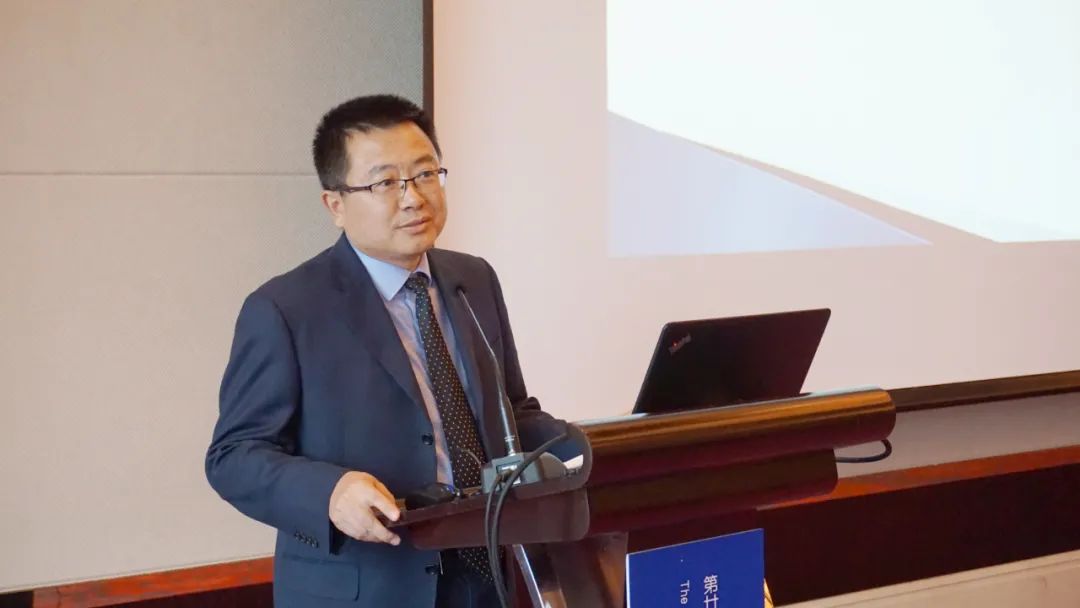
Xu Hua, Director, General Office, Department of Industrial Policies, Laws and Regulations, Ministry of Industry and Information Technology (MIIT)
Under such context, government departments should strengthen collaboration to chart a path for industrial green development. Mr. Xu Hua spoke about the role of the 30•60 Goal. It is a broad and profound change in the economic and social environment. To this end, the MIIT, the People’s Bank of China and the China Banking Regulatory Commission, and the China Securities Regulatory Commission jointly issued the Guiding Opinions on Strengthening Industrial Integration to Promote Industrial Green Development, which clarified the key directions of industrial green development. The MIIT will support companies and industry organizations in exploring low-carbon paths and promote a stronger, green and healthy development of global trade.
Mr. He Hongliang, Deputy Director of Industry Management Development Centre at the China Electronics Standardization Association (CESA), shared some updates in the ICT industry. He said that in response to the 30•60 Goal, a series of national standards and government documents have been updated. The CESA also invited ICT experts to review the SJ/T16000 Guide to Social Responsibility in the Electronic Information Industry. The next step is to incorporate factors such as green supply chain, biodiversity, and supply chain security into the new version of this standard, so as to better promote the green development of the industrial chain and incorporate the 30•60 Goal into the ICT industry.
Mr. Du Yonghai, General Manager of the Green Living & Innovation Division of Hong Kong Productivity Council, elaborated on the progress of the 30•60 Goal in Hong Kong based on the Hong Kong's Climate Action Plan 2050 released in October 2021. He pointed out that Hong Kong peaked the carbon dioxide emissions in 2014 and is expected to achieve carbon neutrality in 2050. Hong Kong will take sustainable actions from aspects of net-zero power generation, green transportation and waste management to achieve carbon neutrality according to local conditions.
Mr. Michiel Lips, Compliance Manager of ANWB Retail outlined the Corporate Sustainability Reporting Directive (CSRD) issued by the European Commission this year. He specified one of the three objectives of CSRD, that is, to reduce systemic risks to the economy and improve the allocation of financial capital to companies and activities that address social, health, and environmental problems and to make companies more accountable for their impacts on people and the environment. It will also spur European companies towards the green transition.
Tools provided by associations facilitate green industry transition
Chinese and international associations play a vital role in the green transition of the global economy. In response to the European Green Deal, amfori designed tools to empower its members; to follow China's 14th Five-Year Plan that aims to shape a new environmentally friendly era, Chinese associations also updated industry policies to advance the low-carbon transition of companies.

Richard Dictus, amfori President
"Over the last couple of years, we have witnessed winds of changes blowing in that same direction, where key players like Asia and the EU have decided to make dramatic policy changes towards a green and inclusive recovery." Mr. Richard Dictus shared in his welcoming address. He called on all parties to realize the role of global trade in addressing COVID-19 impact and climate change, and implement practical and sustainable solutions to protect our planet.
So to address this, amfori has designed a specific tool, amfori BEPI to support its members in improving their environmental performance across the whole supply chain and also enable businesses to collaborate with industry peers which saves time and resources and reduces duplication of efforts. Such partnerships also leads to a greener, more sustainable, and inclusive world for both people and the planet.
Ms. Wang Wenhua, Deputy Secretary General, China Chain Store & Franchise Association (CCFA), introduced the association’s efforts in promoting the CSR systems in the industry and awakening consumer-side environmental awareness to promote green supply chains. In 2021, CCFA issued the Guidelines on Corporate Social Responsibility Management for Chain Stores & E-Commerce Platforms, which provides a four-step plan for companies to implement CSR and ESG management, thus advancing retail companies to strengthen sustainability management.
Low-carbon trend accelerates the green supply chain practices
Globally, tackling climate change remains a complicated task, and the transition to green and low-carbon economy and society is the only way to address it. Dealing with global warming and building a green and sustainable supply chain are not only the key content of the UN SDGs, but also an approach to helping developing and least developed countries promote high-quality economic and social development and ecological protection.
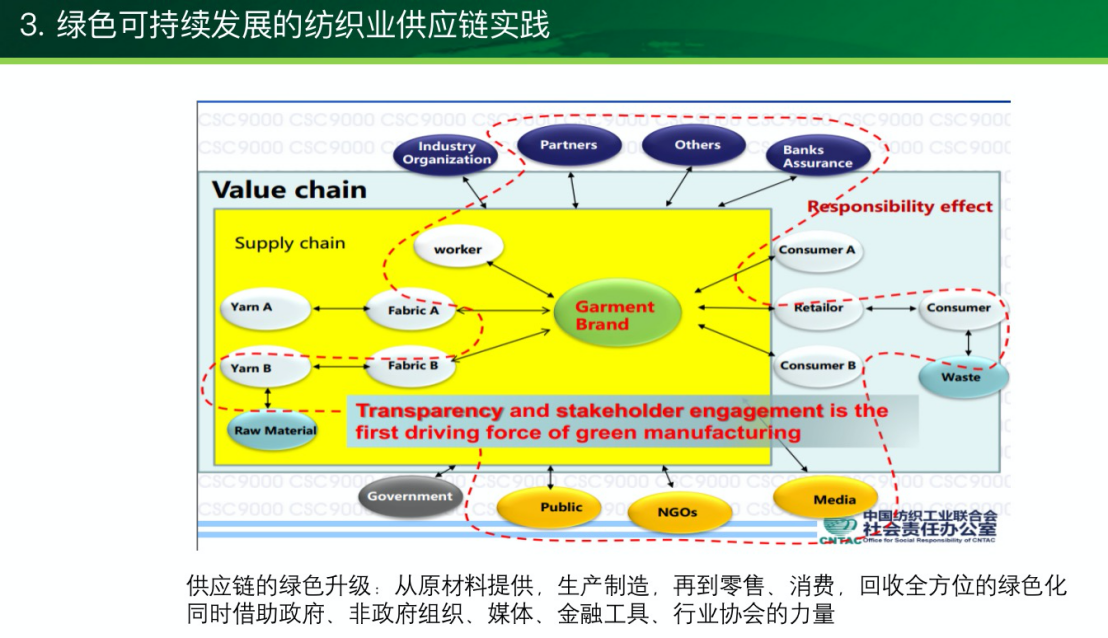
Mr. Zhao Zhongxiu, President of Shandong University of Finance and Economics, highlighted the textile industry with high chemical pollution. The global annual output of textile chemicals has reached 6.4 million tons. To reduce pollution from the textile supply chain is the key to the transition of the global green economy. Mr. Zhao elaborated on each link of the whole life cycle of the textile industry supply chain, proposed measures for the green upgrade of global textile companies. It is expected to leverage the green supply chain empowered by digitalization to help achieve China’s 30•60 Goal in the future.
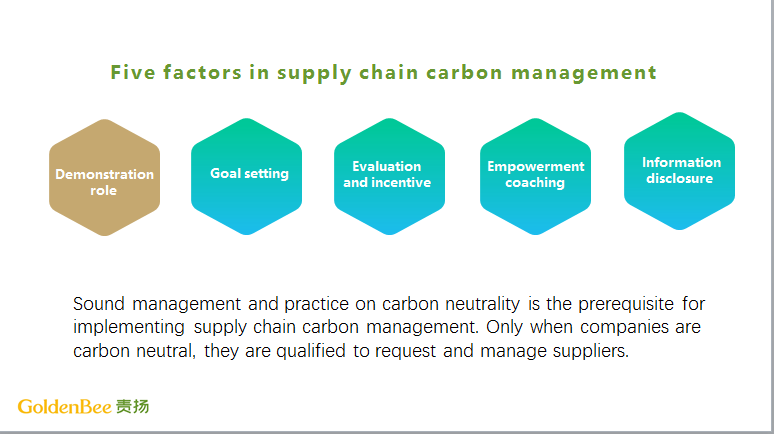
Mr. Zhao Baozhu, Executive General Manager, Beijing Center of Carbon Management and Sustainable Development Division, GoldenBee Consulting, spoke about the importance of supply chain carbon management and carbon disclosure. He stressed that supply chain is a key reason for carbon emissions. Well-known brand companies have begun to regard carbon reduction target as one of the review thresholds for cooperation. The green supply chains and supply chain carbon management are imperative. Mr. Zhao put forward suggestions on the supply chain management from the multi-dimensional perspectives, including carbon management goal setting, evaluation and incentives, supplier empowerment, and information disclosure, which provide good theoretical and practical reference for businesses to build a green supply chain in the future.
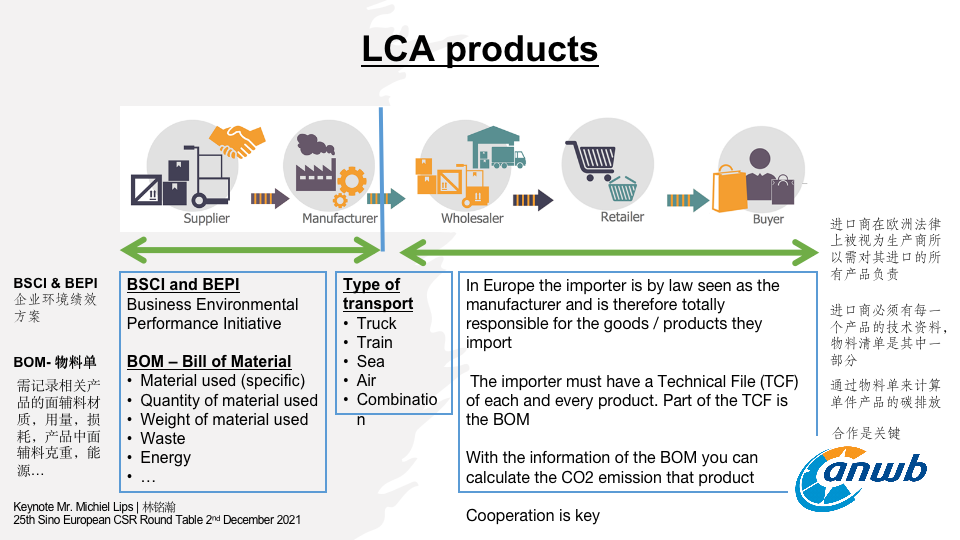
Mr. Michiel shared that ANWB tracks and improves the company’s supply chain by accurately knowing its role in the supply chain, identifying and recording the right information regarding operation, products, energy use, laws and regulations, and calculating carbon footprint, so as to businesses’ environmental performance of retailers, suppliers and wholesalers. Mr. Michiel emphasized that companies should ensure that there is adequate publicly available information to explain their own impact on people and the environment, and encourage companies to reduce carbon emissions by disclosing information on carbon footprint, and to choose energy sources that facilitate business’ sustainable development.
Multi-dimensional coordination for global green trade
Faced with increasingly serious environmental problems, both developed and developing countries have adopted corresponding measures to promote green development. However, it is undeniable that different countries and regions have unbalanced development levels and methods. In today's increasingly globalized economy, promoting the development of global green trade urgently requires concerted action by all parties.
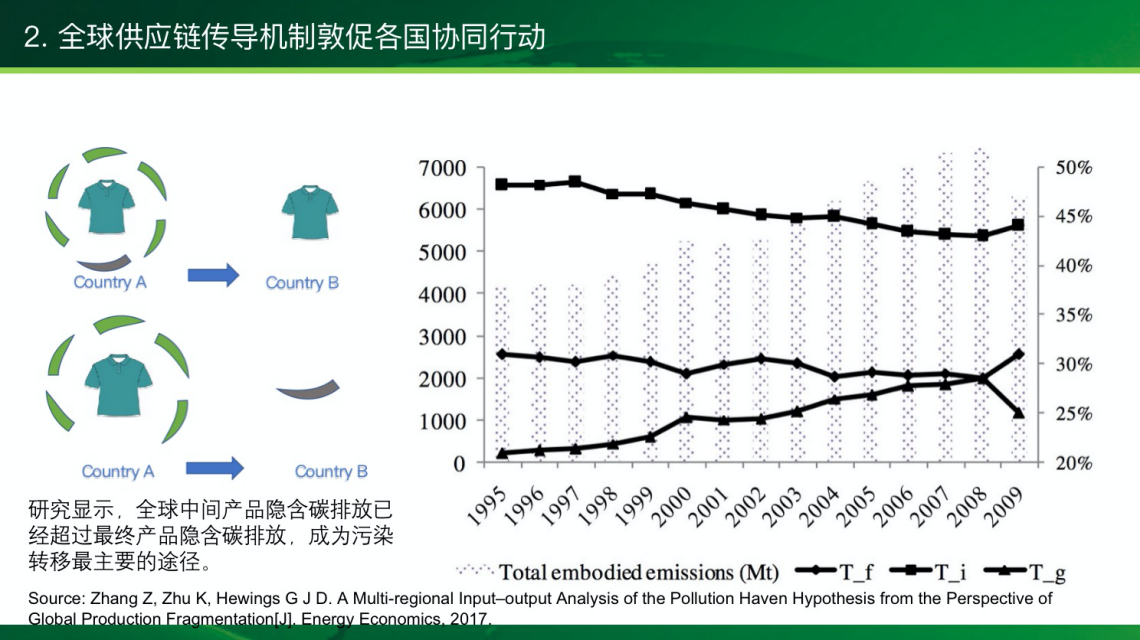
Mr. Zhao Zhongxiu shared that after the 1990s, economic globalization accelerated, and multinationals boosted the global trade layout. A series of research results showed that the world has formed a production and consumption system where everyone has a stake. Therefore, the current transmission mechanism model of the global supply chain urges countries to take coordinated actions on building a green and low-carbon global value chain.
In addition, in the panel discussion, Mr. Coney Ke, Secretary of the Board of Directors, Sinochem International, retaliated the role of the company’s decision-makers in sustainability management. Under the new trend of green and low-carbon development, the company has established a sustainability committee and the chairman takes the lead in advancing the green projects. At the same time, the requirement of sustainable development and local policies and regulations are also included in the international project implementation. Ms. Wang from CCFA also introduced that the association puts social responsibility as its core and highlights ESG and corporate governance to promote the development of global green trade from both the consumer side and the enterprise side. Mr. He from CESA provided valuable suggestions for ICT companies to improve their environmental performance from three major links, including the full life cycle of supplier products, IT-based management and information disclosure, and the use of evaluation tools.
“Low-carbon and zero-carbon is the inevitable trend of global development in the future. China's central document stated that speeding up the building of a green trading system is not only an important policy basis, but also the only way for the times." Mr. Yu Zhihong, President and Editor-in-chief, China Sustainability Tribune concluded the session by echoing the partnership among all stakeholders. He said that building a green trading system requires all parties to re-examine and promote the development of the global trade system from a green and low-carbon perspective: brands and suppliers must strengthen their responsibilities and capabilities to improve green supply chains; consumers should be guided to play their role in raising low-carbon awareness in the green trade system; industry organizations should advance the talent training and the green development of SMEs.
Green trade in the context of the 30·60 Goal is inseparable from the change of consciousness of all parties, and the innovative practice. Close partnerships can lead to the achievement of carbon neutrality and a global green trading system!

 Back
to top
Back
to top